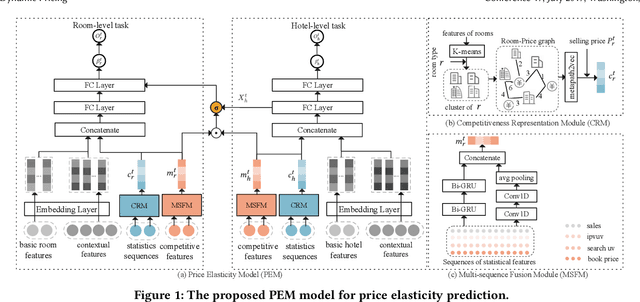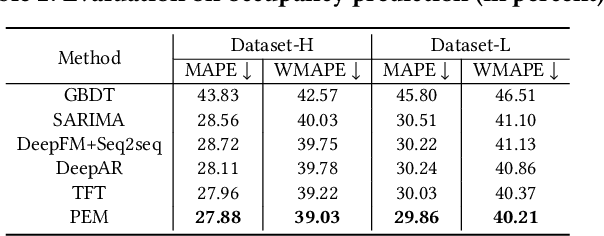Wendong Xiao
Modeling Price Elasticity for Occupancy Prediction in Hotel Dynamic Pricing
Aug 11, 2022



Abstract:Demand estimation plays an important role in dynamic pricing where the optimal price can be obtained via maximizing the revenue based on the demand curve. In online hotel booking platform, the demand or occupancy of rooms varies across room-types and changes over time, and thus it is challenging to get an accurate occupancy estimate. In this paper, we propose a novel hotel demand function that explicitly models the price elasticity of demand for occupancy prediction, and design a price elasticity prediction model to learn the dynamic price elasticity coefficient from a variety of affecting factors. Our model is composed of carefully designed elasticity learning modules to alleviate the endogeneity problem, and trained in a multi-task framework to tackle the data sparseness. We conduct comprehensive experiments on real-world datasets and validate the superiority of our method over the state-of-the-art baselines for both occupancy prediction and dynamic pricing.
LHRM: A LBS based Heterogeneous Relations Model for User Cold Start Recommendation in Online Travel Platform
Aug 05, 2021



Abstract:Most current recommender systems used the historical behaviour data of user to predict user' preference. However, it is difficult to recommend items to new users accurately. To alleviate this problem, existing user cold start methods either apply deep learning to build a cross-domain recommender system or map user attributes into the space of user behaviour. These methods are more challenging when applied to online travel platform (e.g., Fliggy), because it is hard to find a cross-domain that user has similar behaviour with travel scenarios and the Location Based Services (LBS) information of users have not been paid sufficient attention. In this work, we propose a LBS-based Heterogeneous Relations Model (LHRM) for user cold start recommendation, which utilizes user's LBS information and behaviour information in related domains and user's behaviour information in travel platforms (e.g., Fliggy) to construct the heterogeneous relations between users and items. Moreover, an attention-based multi-layer perceptron is applied to extract latent factors of users and items. Through this way, LHRM has better generalization performance than existing methods. Experimental results on real data from Fliggy's offline log illustrate the effectiveness of LHRM.
 Add to Chrome
Add to Chrome Add to Firefox
Add to Firefox Add to Edge
Add to Edge